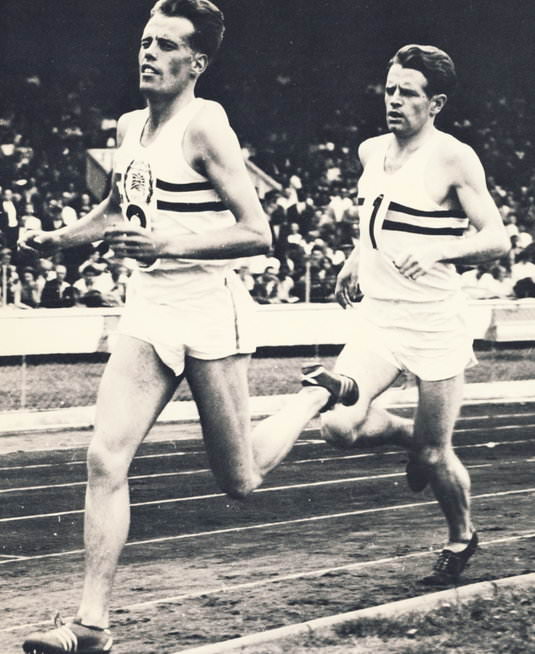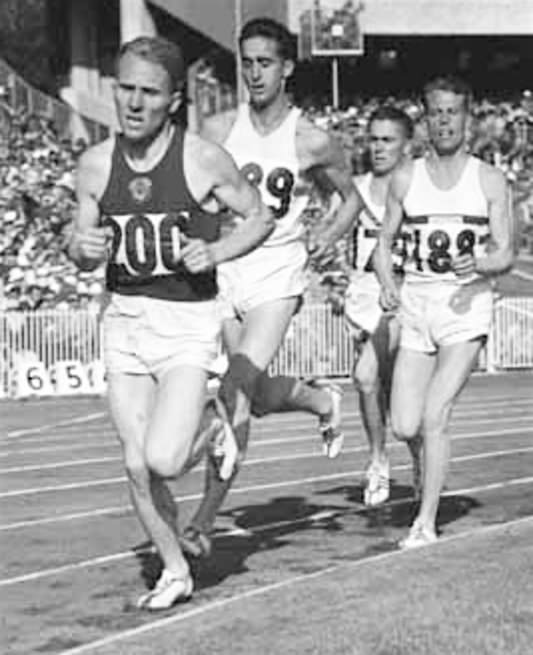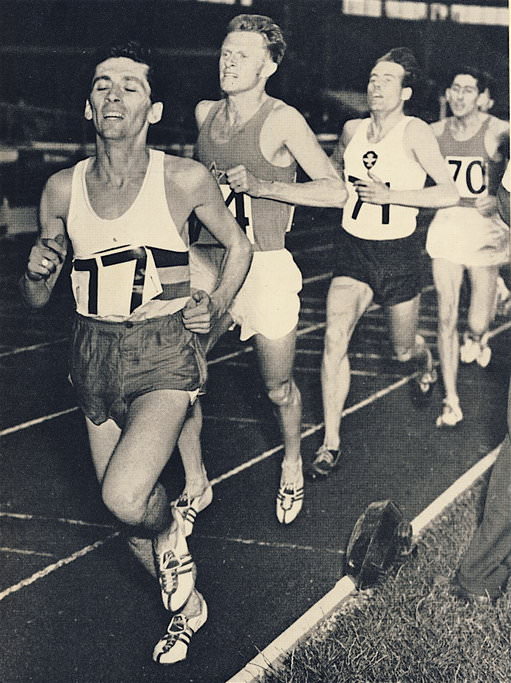PROFILE: DEREK IBBOTSON
b. 1932
Huddersfield-born Derek Ibbotson personifies Yorkshire grit. Not blessed with the basic talent of some of his rivals, he more than made up for this with his determination and courage. I have an enduring vision of him training with Alan Simpson at my local track: there was a hunger in his pained face, a desperation in his ungainly running action. Did anyone train as hard as this? Ibbotson wanted success badly, and he was willing to make the necessary sacrifices. Herb Elliott, in his introduction to Ibbotson’s book Four-minute Smiler, wrote that “Derek’s greatness comes from his competitive spirit; the will to excel; strength built into him from years of hard cross-country running; and the accompanying ability to drive himself to the limits of endurance.” (FMS, 12)
Longwood Harrier
On leaving school at 16 to become an apprentice electrician, Ibbotson joined Longwood Harriers and received some good advice from club members. He did not train hard at this stage. At 16 he won the Junior Mile in a Huddersfield meeting. His time was 4:30.5. He went on to win the Yorkshire Junior Mile title three years in a row from 1949. Then, once a senior, he won the 1952 Yorkshire Three Miles and earned a trip to London for the Inter-Counties meeting. He ran well for fifth place and ran an impressive 14:06.8 PB. After this, his final exams for his diploma took him away from the running track and ended his season.
 |
| Competing for England. Chataway follows. |
Ibbotson’s 1953 season was a write-off because of a work-related ankle injury. On returning to racing in 1954, he ran at about the same level as in 1952. A big change came when he joined the RAF at the end of 1954: “Running became a serious business. I gained more successes, but lost a lot of fun.” (FMS, 41) He credits the help he received in the RAF for his successes. Under Squadron-Leader Davis he was introduced to interval training and given a winter schedule for cross-country running. His first cross-country season in 1955 included some high championship placings: 3rd in the Yorkshire, 4th in the RAF and 8th in the Northern.
Emerging Star
He showed even better form on the track, pushing Gordon Pirie on the last lap of a 2,000 metres race. Pirie, passing Ibbotson in the final straight, recorded the fast time of 5:09.8, only 2.8 seconds outside Reiff’s WR. There were better things to come. In the Inter-Counties Three Miles, Ibbotson beat Sando and Norris with a remarkable time of 13:34.6. The Times hailed “the arrival of a three-miler of the first class.” (Times, May 30, 1955) Franz Stampfl approached him after this race and offered to send him training schedules. But Stampfl left for Australia a few weeks later and had no further contact. Ibbotson raced a lot in 1955; he helped Chataway to a Three-Miles WR, and he ran one of the few Six Miles in his career, clocking 28:52. The year had been a remarkable one: “In the spring I had hardly been known as a runner outside Yorkshire,” he wrote. “Now I had run four times for Britain.” (FMS, 58)
Ibbotson now looked to be a good prospect for the Melbourne Olympics. He trained even harder in the winter of 1955-56. All the time he was looking for more strength and speed to beat his big rival Chataway. Always a frequent racer, Ibbotson ran most of the big cross-country races: 9th in the Inter-Counties, 1st at Hannut International, 3rd at English Nationals, 1st in the Services Championships.
Olympic Build-up
When the track season came round, Ibbotson was stronger and faster, and he soon proved this in the AAA Three Miles. He took over the lead on the fourth lap and went through a mile in 4:32.8. He continued to lead with Chataway right on his heels. The next mile also took 4:32. “I kept the pace even because I though it would give me a better chance. That is the only compensation for the leader—he decides the tempo.” (FMS, 59-60) Ibbotson led until 210 yards from the tape. Then Chataway challenged. He let Chataway pass as he was running through puddles on the inside lane. This meant he had to run very wide to attack Chataway again: “It was like holding on to a runaway horse. Entering the final straight (about 60 yards left) I was still about two feet behind. He was giving me a hell of a fight. With the tape in view I made an all-out burst and inch by inch managed to get my chest in front.” (FMS, 60) Ibbotson was British champion in 13:32.6.
He improved on that time in a match against Czechoslovakia with 13:28.2 PB. Then he managed to get into the field for the Emsley Carr Mile, although he had run only 4:07. The plan was to make it a fast race for Ian Boyd to get a good time for his Olympic place. Derek hung on to the leaders and went into the lead before the bell. He won in 3:59.4.
 |
| Following Kuts and Pirie in the early stages of theOlympic 5,000. |
Certainly ready for Melbourne, Ibbotson had one more big race—in Budapest, just before the Russian invasion of Hungary. In this race Chataway and Ibbotson beat the great Iharos over 5,000. It was a tactical race, but his 14:00 behind Chataway (13:59.6) was still a good time. He was disappointed not to be able to fly with the advance party to Melbourne and felt his Olympic chances were drastically reduced: “The long air journey to Australia saps away much of the fitness gained by training in England. The mind recovers before the body, and this is no doubt why I found it difficult to understand how my performances in the earlier days were so much poorer than those of the advanced party.” (FMS 85-6)
Melbourne Olympics
Because of his disappointing form, he did not go into the Olympic 5,000 final with full confidence; he planned to hang on and if possible use his finishing speed. At the halfway mark the three Brits (Ibbotson, Pirie and Chataway) were trailing Kuts. The rest of the field left behind. Chataway, trying to run off a stomach cramp, lost contact with Kuts while in second place. Pirie in third was caught napping and Kuts escaped. Ibbotson and Pirie tried for a lap to regain contact, but the Russian was not to be caught. Ibbotson and Pirie were now running for second. In the final straight Pirie surged by. Still, Ibbotson had the Olympic bronze medal and a 13:54.4 PB.
Mile World Record
With the Olympics in December, Ibbotson’s winter training for the 1957 season was curtailed. His stint in the RAF was over, so he moved to London to take on a sales rep job. After switching clubs from Longwood to South London Harriers, he still managed 16th in the Inter-counties CC. 3rd in the Southern and 6th in the Nationals. His early track times were promising: 3:47.8 for 1,500 and 4;00.6 for a Mile. Then after two races in the USA, He ran 3:58.4 in Glasgow, only 0.4 outside Landy’s WR.
Next up was an Invitation Mile at the White City on July 19. It was an impressive field with Jungwirth, Lewandowski and Delany. There were also some good English runners: Ken Wood, Alan Gordon and Mike Blagrove. Ibbotson asked Blagrove to lead through 880 in 1:56-7. Blagrove obliged with 1:55.8, though the first lap of 55.3 was too fast. Ibbotson was running third behind Jungwirth up to this point. In the third lap Jungwirth took the lead and Ibbotson followed as Blagrove slowed. So did the pace, the bell rang at exactly 3:00. On the back straight, as planned, Ibbotson made his move, quickly passing Jungwirth. Round the last bend, Lewandowski moved into second, while further back, the fast-finishing Delany had left himself too much to do. For Ibbotson it was just a matter of holding on, and he never faltered. The WR was his with 3:57.2. The first four runners were under four, Ron Delany gaining second in 3:58.8.
 |
| On his way to a world record for the Mile.Blagrove leads, with Jungwirthsecond and Delany fourth. |
Ibbotson, always a heavy racer, continued his 1957 season on the continent, where he won his races but recorded no significant times. When he lined up for a Mile on October 19th, he was starting his 48th race of the season. His heavy racing took its toll; he trained poorly over the 1957-8 winter. His 197th place in the Southern CC indicated his poor condition. His track season was not successful either; he wasn’t winning his races and his times were mediocre. He ran a reasonable Two Miles in 8:47.6 and then beat Merv Lincoln in a Mile in Vancouver (4:05.4). Next, a Three-Mile victory in 13:46 was encouraging, but following this he dropped out of the AAA Three Miles after eight laps. After a poor run in the Empire Games, he was dropped from the British team for the Euros.
Late Career
Ibbotson never again reached the level of his glory years despite trying very hard. His best performances in 1959 were victories in the Elmsley Carr Mile in 4:03.6 and in an Invitation Two Miles, where he beat Valentin and Iharos in 8:43.2. Most of the time he languished back in the pack. The Times correspondent detected “an air of nonchalance” in his running. Still, he kept racing. He also faced an AAA inquiry into expense money. In 1960 he was unable to make the Olympic team; his best 5,000 time was 13:52.
Ibbotson continued to compete for much of the 1960s. After a poor 1961 season, he found success on the Indoor circuit, becoming the 1962 European Indoor champion for Two Miles (8:47.8). Outdoors he ran two good Three Miles in the lower 13:20s, finishing third in both the British Games and the AAA Championships. Late in the season he turned down an offer from Finland to turn professional. In 1964 he ran 3:44.4 for 1,500 and 4:01.6 for the Mile, prompting The Times correspondent to write of “the heart-warming return of Ibbotson.” He even made the Empire Games team, placing 8th in the Three Miles. In 1965 he was still representing his country indoors. Later in the year he paced Kip Keino for the first two laps of a Mile in 1:58.3. A Pathe film of this shows a heavier Ibbotson totally spent and dropping out at 880. In 1967 he was still competing, clocking 9:01.8 for Two Miles.
Conclusion
Ibbotson should be remembered for his fine Olympic 5,000 bronze as well as for his Mile WR. He had an unusual career with a meteoric rise to the top level, a short period at the top and then a long period just below the top level. Clearly his two-year stint in the RAF (1955-56) was a crucial factor in his top-level performances. The benefit of being able to focus on his running at this time carried him through the 1957 season as well. Subsequently, he never managed to regain his top form. Experts also point to his excessive racing. Ultimately, Ibbotson’s competitive spirit, so admired by Herb Elliott, was a double-edged sword: it led to some great performances but it also led to his entering too many races. After 1957 this excessive competition definitely affected his performances. 
12 Comments